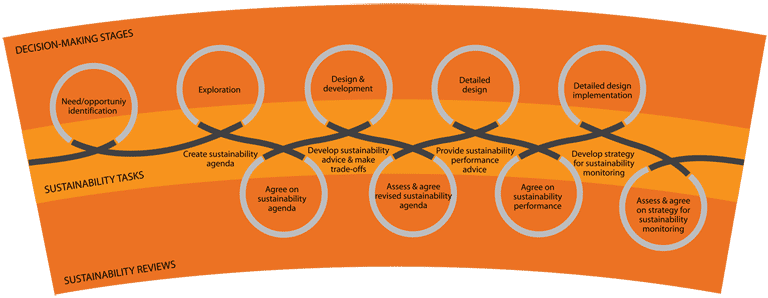- Info
The Urban Design Decision-Making Process

This tool demonstrates a
new way of thinking about urban design decision-making by diagrammatically
representing how an urban development project evolves, from an idea through to
the implementation of a design. Critical to this new process is the incorporation
of sustainability at each stage of the process. Below you will find a chronological explanation of each stage in the process.
To download a PDF file about this process in detail, click here. (pdf document, 1.4MB)
To view VivaCity Tools and Resources in order of stages in this process, click here.
The Decision-Making Stages
- Need / Opportunity Identification - An
individual or team identifies a need or an opportunity for an urban development
project.
- Create Sustainability Agenda - The Project
Sustainability Group creates the Sustainability Agenda from knowledge,
information and recorded decisions in the legacy archive or in relation to
historical and current factors. The Group first outlines sustainability issues
believed to be important to the urban development project context and then
prioritises the issues. The Development Team may also help to inform the
Sustainability Agenda by using various tools to examine sustainability within
the urban development project, including consultation with stakeholders who
will be impacted by the urban development project.
- Exploration - A Development Team is formed
to explore the urban development project from all perspectives. A Project
Sustainability Group is also formed.
- Revisit Create Sustainability Agenda
- Agree on Sustainability Agenda - Before the
Development Team begins designing and developing their plans for an urban
development project, they must agree on the Sustainability Agenda with the
Project Sustainability Group.
- Develop Sustainability Advice and
Make Trade-Offs - Here, planners are able to
turn to the Sustainability Resources developed throughout our project for
guidelines and information in order to create the most sustainable urban
environment possible. The Project Sustainability Group and the Development Team
develop Sustainability Advice from an ongoing series of trade-off discussions
as part of pre-planning application meetings. Both teams give and seek advice
regarding the sustainability of the urban development project, explaining and
negotiating sustainability trade-offs where necessary. Recourse to
Sustainability Resources, techniques and knowledge is taken at this point. As a
result of the trade-off discussions, revisions will be made to the
prioritisation of sustainability issues and the revised Sustainability Agenda
will be presented at the Sustainability Review.
- Design and Development - This stage
corresponds to traditional Design and Construction management processes. This
stage allows the Development Team to begin designing the urban development plan
and consider design and development issues relating to sustainability.
- Revisit Develop Sustainability Advice and
Make Trade-Offs
- Assess and Agree Revised Sustainability
Agenda - The Project Sustainability Group discusses and agrees the re-prioritisation
of the Sustainability Agenda with the Development Team. This ensures that both
teams are kept informed of the role of sustainability in the project. The Group
also agrees on the preliminary designs created by the Development Team.
- Provide Sustainability Performance Advice- The
Project Sustainability Group and the Development Team elicit and provide
Sustainability Performance Advice as part of pre-planning application meetings.
This task gives both teams the opportunity to discuss the proposed performance
of the urban development project design and give initial feedback before the
formal performance assessment occurs at the Sustainability Review.
- Detailed Design - This stage corresponds to
traditional Design and Construction management processes. Here the Development
Team progresses in more detail with the designs of the urban development plan,
offering an in-depth understanding of design and development issues relating to
sustainability.
- Revisit Provide Sustainability Performance
Advice
- Agree on Sustainability Performance - The
Project Sustainability Group assesses the performance of the detailed design
against the Sustainability Agenda. Compliance between the design and the
Sustainability Agenda means the Development Team can submit their plan for
planning approval. Non-compliance means the two teams will have to continue
negotiating the sustainability trade-offs.
- Develop Strategy for Sustainability
Monitoring - Once the urban development project has been built, the Project
Sustainability Group and the Development Team will agree on a Strategy for
Sustainability Monitoring. The strategy may include a timeline, budgets and
sustainability statements required for the lifetime of the development.
- Detailed Design Implementation - This stage
corresponds to traditional Design and Construction management processes. Once
planning permission has been sought, this stage allows for the urban
development project to be built via the construction process.
- Revisit Develop Strategy for Sustainability
Monitoring
- Assess and Agree on Strategy for
Sustainability Monitoring - The Strategy for Sustainability Monitoring is
reviewed and assessed to ensure that whoever is assuming the curatorial role is
able to manage and maintain the urban development project in the short- and long-term.
The legacy archive and the Project Sustainability Reviews will be used to guide
the assessment.
 View All Tools
View All Tools
© Images Copyright Andrew Wooton 2008


